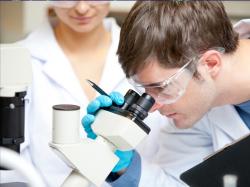As Lab-Grown Meat Inches Closer To US Market, Industry Wonders Who Will Regulate?
August 25, 2016 | 2 min to read

The first hamburger cooked with labmade meat didn’t get rave reviews for taste. But the test tube burger, rolled out to the press in 2013, has helped put a spotlight on the question of how the U.S. government will regulate the emerging field of cellular agriculture, which uses biotechnology instead of animals to make products such as meat, milk, and egg whites.
So far, none of these synthetic foods has reached the marketplace. But a handful of startup companies in the United States and elsewhere are trying to scale up production. In the San Francisco Bay area in California, entrepreneurs at Memphis Meats hope to have their cell-cultured meatballs, hot dogs, and sausages on store shelves in about 5 years, and those at Perfect Day are targeting the end of 2017 to distribute cow-free dairy products. It’s not clear, however, which government agencies would oversee this potential new food supply.
Historically, the U.S. Department of Agriculture (USDA) regulates meat, poultry, and eggs, whereas the Food and Drug Administration (FDA) oversees safety and security for food additives. FDA also approves so-called biologics, which include products made from human tissues, blood, and cells, and gene therapy techniques. But emerging biotechnologies may blur those lines of oversight, because some of the new foods don’t fit neatly into existing regulatory definitions. “Cellular culture raises a lot of questions,” says Isha Datar, CEO of New Harvest, a New York City–based nonprofit founded to support this nascent industry.
To read the rest of the story, please go to: American Association for the Advancement of Science
